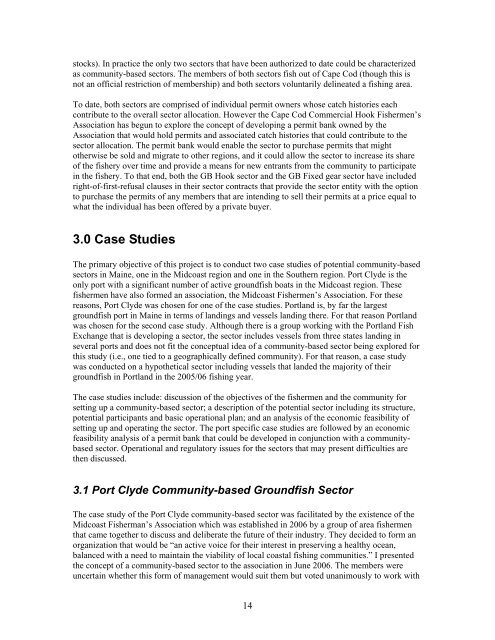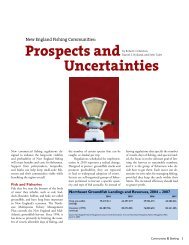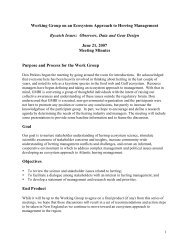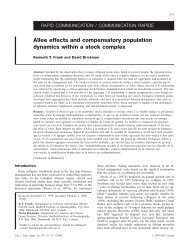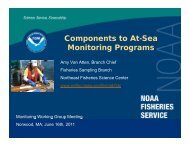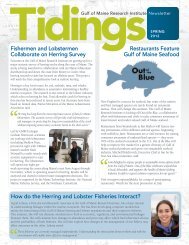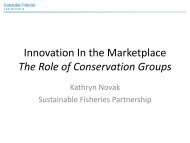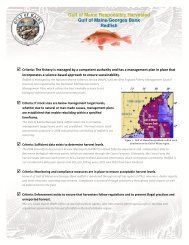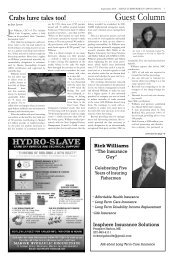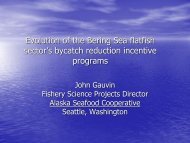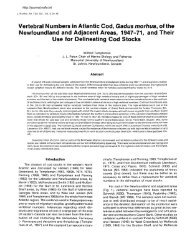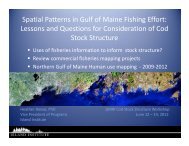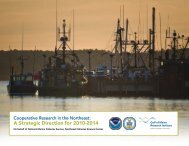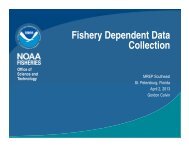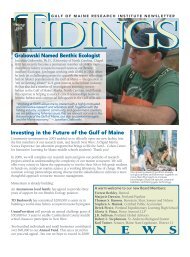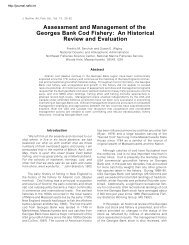Community-based Sectors for the New England Groundfish Fishery
Community-based Sectors for the New England Groundfish Fishery
Community-based Sectors for the New England Groundfish Fishery
Create successful ePaper yourself
Turn your PDF publications into a flip-book with our unique Google optimized e-Paper software.
stocks). In practice <strong>the</strong> only two sectors that have been authorized to date could be characterized<br />
as community-<strong>based</strong> sectors. The members of both sectors fish out of Cape Cod (though this is<br />
not an official restriction of membership) and both sectors voluntarily delineated a fishing area.<br />
To date, both sectors are comprised of individual permit owners whose catch histories each<br />
contribute to <strong>the</strong> overall sector allocation. However <strong>the</strong> Cape Cod Commercial Hook Fishermen’s<br />
Association has begun to explore <strong>the</strong> concept of developing a permit bank owned by <strong>the</strong><br />
Association that would hold permits and associated catch histories that could contribute to <strong>the</strong><br />
sector allocation. The permit bank would enable <strong>the</strong> sector to purchase permits that might<br />
o<strong>the</strong>rwise be sold and migrate to o<strong>the</strong>r regions, and it could allow <strong>the</strong> sector to increase its share<br />
of <strong>the</strong> fishery over time and provide a means <strong>for</strong> new entrants from <strong>the</strong> community to participate<br />
in <strong>the</strong> fishery. To that end, both <strong>the</strong> GB Hook sector and <strong>the</strong> GB Fixed gear sector have included<br />
right-of-first-refusal clauses in <strong>the</strong>ir sector contracts that provide <strong>the</strong> sector entity with <strong>the</strong> option<br />
to purchase <strong>the</strong> permits of any members that are intending to sell <strong>the</strong>ir permits at a price equal to<br />
what <strong>the</strong> individual has been offered by a private buyer.<br />
3.0 Case Studies<br />
The primary objective of this project is to conduct two case studies of potential community-<strong>based</strong><br />
sectors in Maine, one in <strong>the</strong> Midcoast region and one in <strong>the</strong> Sou<strong>the</strong>rn region. Port Clyde is <strong>the</strong><br />
only port with a significant number of active groundfish boats in <strong>the</strong> Midcoast region. These<br />
fishermen have also <strong>for</strong>med an association, <strong>the</strong> Midcoast Fishermen’s Association. For <strong>the</strong>se<br />
reasons, Port Clyde was chosen <strong>for</strong> one of <strong>the</strong> case studies. Portland is, by far <strong>the</strong> largest<br />
groundfish port in Maine in terms of landings and vessels landing <strong>the</strong>re. For that reason Portland<br />
was chosen <strong>for</strong> <strong>the</strong> second case study. Although <strong>the</strong>re is a group working with <strong>the</strong> Portland Fish<br />
Exchange that is developing a sector, <strong>the</strong> sector includes vessels from three states landing in<br />
several ports and does not fit <strong>the</strong> conceptual idea of a community-<strong>based</strong> sector being explored <strong>for</strong><br />
this study (i.e., one tied to a geographically defined community). For that reason, a case study<br />
was conducted on a hypo<strong>the</strong>tical sector including vessels that landed <strong>the</strong> majority of <strong>the</strong>ir<br />
groundfish in Portland in <strong>the</strong> 2005/06 fishing year.<br />
The case studies include: discussion of <strong>the</strong> objectives of <strong>the</strong> fishermen and <strong>the</strong> community <strong>for</strong><br />
setting up a community-<strong>based</strong> sector; a description of <strong>the</strong> potential sector including its structure,<br />
potential participants and basic operational plan; and an analysis of <strong>the</strong> economic feasibility of<br />
setting up and operating <strong>the</strong> sector. The port specific case studies are followed by an economic<br />
feasibility analysis of a permit bank that could be developed in conjunction with a community<strong>based</strong><br />
sector. Operational and regulatory issues <strong>for</strong> <strong>the</strong> sectors that may present difficulties are<br />
<strong>the</strong>n discussed.<br />
3.1 Port Clyde <strong>Community</strong>-<strong>based</strong> <strong>Groundfish</strong> Sector<br />
The case study of <strong>the</strong> Port Clyde community-<strong>based</strong> sector was facilitated by <strong>the</strong> existence of <strong>the</strong><br />
Midcoast Fisherman’s Association which was established in 2006 by a group of area fishermen<br />
that came toge<strong>the</strong>r to discuss and deliberate <strong>the</strong> future of <strong>the</strong>ir industry. They decided to <strong>for</strong>m an<br />
organization that would be “an active voice <strong>for</strong> <strong>the</strong>ir interest in preserving a healthy ocean,<br />
balanced with a need to maintain <strong>the</strong> viability of local coastal fishing communities.” I presented<br />
<strong>the</strong> concept of a community-<strong>based</strong> sector to <strong>the</strong> association in June 2006. The members were<br />
uncertain whe<strong>the</strong>r this <strong>for</strong>m of management would suit <strong>the</strong>m but voted unanimously to work with<br />
14


